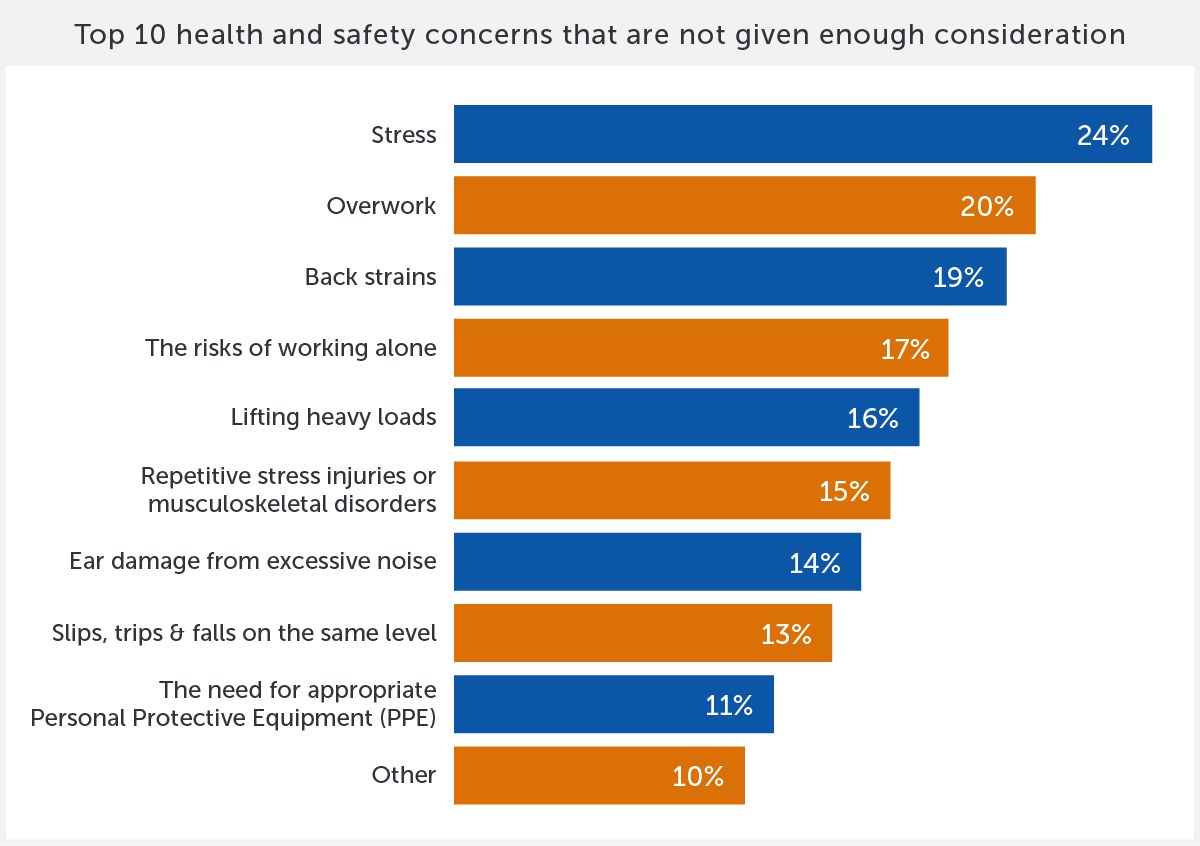
By Carrie Winans
“It took about 200 years for unions to get us a 40 hour work week and it took smartphones about 5 years to completely take them away” – Bob Sullivan, NBC Nightly News.
What do the United States, Argentina, and Sudan have in common? Surprisingly, it’s overworked employees. With no required time off each week, these nations share a chronic overwork epidemic.
These days everyone seems overworked and exhausted. In fact, 20% of respondents to the 2014 Health and Safety Industry Survey conducted by MySafetySign stated that overwork was a top concern often overlooked by employers. Employers need to reexamine the definitions and warning signs of overwork and binge working. It’s time to start telling employees to “go home.”
Via MySafetySign
Overwork
Overwork has become a more prevalent problem among today’s workforce than our parents’ generation could have dreamed. The root cause of overwork can be blamed on technology – specifically smart phones and email. David Solomon, the global co-head of investment banking at Goldman Sachs, told The New Yorker’s James Surowiecki, “Today, technology means that we’re all available 24/7. And, because everyone demands instant gratification and instant connectivity, there are no boundaries, no breaks.”
 Surowiecki’s Cult of the Overwork notes, “A 2008 Harvard Business School survey of a thousand professionals found that 94% worked 50 hours or more a week, and almost half worked in excess of 65 hours a week. Overwork has become a credential of prosperity.” This is a big jump from the standard 9-5 workday myth.
Surowiecki’s Cult of the Overwork notes, “A 2008 Harvard Business School survey of a thousand professionals found that 94% worked 50 hours or more a week, and almost half worked in excess of 65 hours a week. Overwork has become a credential of prosperity.” This is a big jump from the standard 9-5 workday myth.
Overwork can be most easily recognized as excessive work that directly impacts the emotional or physical health of an employee. Early warning signs include irritability, difficulty falling or staying asleep, forgetfulness, excessive self-criticism, and irrational fears surrounding work deadlines and projects.
NBC’s Nightly News reported that one-third of heart disease is related to stress. Chronic overworking can double that risk.
Binge Working
While the risk of heart disease is troubling enough, binge working has led to several deaths. Young employees working competitive internships and apprenticeships literally work themselves to the grave.
December 2013 brought a binge working death to international attention. Mita Diran, a 24-year-old Indonesian copy writer, worked 30 hours straight before slipping into a coma and passing away. Over the summer, 21-year-old Moritz Erhardt died in London after a 72-hour binge working period at Bank of America Merrill Lynch.
Binge working differs from overworking in two ways. Binge working is working successive hours with no break or sleep, while overworking implies working additional hours over time. Most credit overwork to technology and connectivity, but binge working is often a result of company culture and reward systems.
Ken Matos, workplace trend researcher at Families and Work Institute told TODAY Money, “Organizations can develop a culture that focuses on the effort expended rather than the quality provided. I call these cultures of self-sacrifice, where employee value is measured not by how productive they are but by how much time and personal sacrifices they need to make to complete their work.”
When to Say “Go Home”
Employers have the power to create rules and regulations to restrict overwork and binge working. By enforcing these rules and emphasizing the importance of a work-life balance, employees can work safely with higher morale.
A deliberate quitting time helps avoid excessive work issues. If business hours are 9-5, tell employees that everyone should exit no later than 5:30pm. The additional half hour allows time to finish up the occasional last minute project, but still gets everyone home for downtime. The day manager or head of office should be responsible for enforcing this rule and locking up the space afterwards.
Avoid cultures of “self-sacrifice” by setting clearer workplace priorities. Rather than focusing on the personal sacrifices, such as loss of sleep and missed family time, focus on the quality of the employee’s work. A reward system based on efficient, accurate work will be more rewarding than a culture that acknowledges those who stay at a desk until 10pm.
Employers should make time for regular checkups about internal workloads. Can the staff achieve their expectations? If not, consider options such as additional hires, freelancers, interns, or outsourcing in order to ease the burden on overworked and stressed out team members. Additional help will allow employees to focus on the most important tasks and create the best possible product.
Company leadership should consider holding office hours for additional internal feedback. Even if the work load is manageable and expectations are realistic, external pressures such as family illness, a new baby, or an unexpected financial burden, can make work feel overwhelming. Allowing employees to ask for a temporary roll back in responsibilities or additional personal time will lead to a better environment for the entire company.
Solutions
Working hard and achieving career goals can be incredibly rewarding. Recognizing that our years are limited and that life should exist beyond work is the true achievement, though. Next time you prepare to leave the building, will you tell your coworkers to “go home”?
Carrie Winans is the public relations associate for SmartSign and its 30 brands, including MySafetySign. Winans is a graduate of The George Washington University and NYC’s most avid latte connoisseur.
